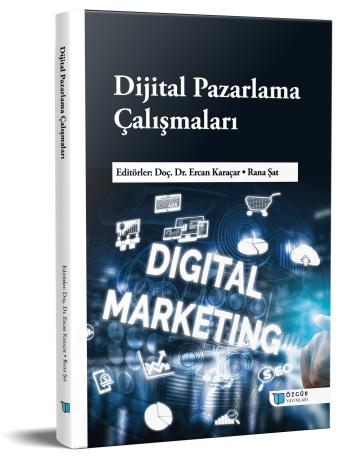
The Role of Digital Marketing in Gastronomy: New Trends Shaping Customer Experience
Chapter from the book:
Karaçar,
E.
&
Şat,
R.
(eds.)
2025.
Digital Marketing Studies.
Synopsis
Free time is a phenomenon that provides individuals with a sense of satisfaction, includes a certain lifestyle, contributes to the formation of belief systems and is seen as an expression of the ideal lifestyle. At the same time, it plays an important role in supporting the feeling of happiness through elements such as achieving a healthy body and increasing the quality of life (Karaçar 2019a). Another concept that is effective in the change of free time is technology. Technology plays a transformative role in every aspect of life as one of the most fundamental elements that deeply affects the social and economic structure and constantly evolves. Businesses operating in various sectors such as production, transportation, economy, health, education, security, service and food closely follow technological innovations in order to gain sectoral competitive advantage (Dizman, 2024). Although tourism is generally defined as travels for the purpose of entertainment, rest, discovery and getting to know new places, it appears to be a very complex area due to its interaction with economic activities and social life. Economic and technological developments directly affect the tourism sector, as in other sectors. In recent years, many academic studies have been conducted on the effects and applications of technology-focused developments in the tourism sector, and various discussions have been brought to the agenda in this field (Öztürk, 2020). In this context, it is extremely important to evaluate the impact of technology on innovations in the field of gastronomy and to address these innovations from a marketing perspective. The gastronomy sector is undergoing a significant transformation process in terms of both product presentation and service methods due to the impact of technological developments. Digital technologies play a decisive role in shaping gastronomic marketing, especially in areas such as analyzing consumer behavior, providing personalized services, and providing accessibility through online platforms. This study aims to reveal how new trends and digital marketing techniques in gastronomy can be effective in creating and changing customer preferences. The study aims to contribute to the existing literature in the field by providing a more comprehensive approach to the interaction between gastronomy and digital marketing. In addition, the advantages and potential challenges provided by such innovative applications to the sector should also be taken into consideration. Future studies can provide new perspectives to understand how consumer behavior is shaped by technology by examining the effectiveness of digital marketing strategies in the gastronomy sector in more depth. Thus, it will be possible to solve the relationships between the gastronomy sector and digital marketing in a more comprehensive way. In this context, expanding research and addressing it in different dimensions will yield important results in both sectoral practices and academic fields. In this study, minimally productive artificial intelligence technologies were utilized.

